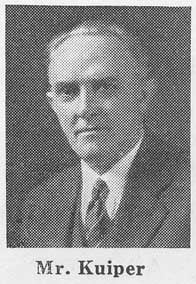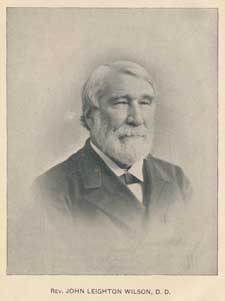What Should Be Done by Christian People Who are in a Modernist Church?
by Dr. J. Gresham Machen
[The following article was originally published in The Presbyterian Guardian, vol. 1, no. 2 (21 October 1935): 22.]
 What is the duty of Christian congregations or Christian individuals who find themselves in a church that is dominated by unbelief? Shall they remain in such a church, or shall they withdraw from it and become members of a consistently Christian Church?
What is the duty of Christian congregations or Christian individuals who find themselves in a church that is dominated by unbelief? Shall they remain in such a church, or shall they withdraw from it and become members of a consistently Christian Church?
That is certainly the question of the hour for the orthodox part of the Presbyterian Church in the U.S.A. Various attempts are being made to answer the question. Various considerations are being urged on one side or the other.
If we separate from the existing church organization, it is being said, shall we be able to retain any of our congregational property, or will that all have to be abandoned to the uses of the existing organization?
On the other hand, if we remain in a church that is dominated by unbelief, does that not mean that we are simply heaping up greater resources for the Modernists in future years to use? Will not every gift that we make, every church building that we put up, be turned over ultimately to the uses of unbelief?
No doubt such considerations on one side or the other of this question are very interesting. I am bound to say in passing that the considerations in favor of separation seem to me to be much stronger than the considerations on the other side.
But I propose to the readers of this page that we should now approach the question in an entirely different way. I propose that we should see what the Bible has to say about the matter. Does the Bible permit Christian people to live year after year, decade after decade, in a church that is so largely dominated by unbelief as is the Presbyterian Church in the U.S.A.?
The answer to that question is surely not difficult. I am not thinking just now so much of individual texts directly bearing on the question, though those texts are not difficult to find and though they are not really balanced by any texts on the other side; but I am thinking of the Bible’s whole teaching about the Church and what the Church ought to mean in the individual’s Christian life. If we read what the Bible says about the Church and then examine the Presbyterian Church in the U.S.A., can we really put our hands upon our hearts and say in the presence of God that the Presbyterian Church in the U.S.A. even approximates being what the Bible says a church of Jesus Christ must be or provides that nurture which the Bible says every Christian ought to have?
Now I know very well that we ought to be careful when interrogating the Bible on this point. Sometimes, when the Bible speaks about the Church, it is speaking about the Church as it will finally be when it appears without blemish before Christ. We have no right to demand of the Church militant a perfection that will belong only to the Church triumphant to the Church in its final, glorious state. When the Bible speaks of the Church militant, the Church as it actually appears upon this earth, it detects always the presence of error and sin in that Church, and it does not permit a Christian to withdraw from that Church or any branch of that Church just because that Church or that branch of it is not perfect.
All this is true. But it really does not apply to the situation in the Presbyterian Church in the U.S.A. The point is that that Church is very largely dominated by unbelief. It does not merely harbor unbelief here and there. No, it has made unbelief, in the form of a deadly Modernist vagueness, the determinative force in its central official life.
Such a body is hardly what the Bible means by a church at all. The Bible commands Christian people to be members of a true church, even though it be an imperfect one. It represents the nurture provided by such a true church as a necessity, not a luxury, in the Christian life. There must therefore be a separation between the Christian and the Modernist elements in the Presbyterian Church in the U.S.A. That is perfectly clear. The only question is how the separation shall be effected.
Unquestionably the best way would be the way of reform. If Modernism should be removed from the Presbyterian Church in the U. S. A., and that church should be brought back to conformity with its constitution and with the Word of God, all would be well.
The other way is the way of separation from the existing organization on the part of the loyal part of the church. Only, if the separation comes, it ought to come in such fashion as to make perfectly clear the fact that those who are separating from the present Modernist organization are not founding a “new church,” but are carrying on the true, spiritual succession of the Presbyterian Church in the U. S. A.
Something will no doubt be said regarding both of these possibilities on this page in future issues of The Presbyterian Guardian.
Words to Live By:
It should always be a fearsome thing to propose division or separation, even for reasons such as stated above. And I am quite certain that separation was never a light matter in Dr. Machen’s consideration. In our daily prayers, we ought to regularly pray for the unity of the Body of Christ, the Church. As long as we are in this sinful flesh, there will always be divisions, for our understanding of God’s Word is imperfect. But the way to greater unity rests not in pushing aside the truth of God’s Word, but rather, in pressing forward to know more and more of God’s will, as revealed in the Scriptures.


